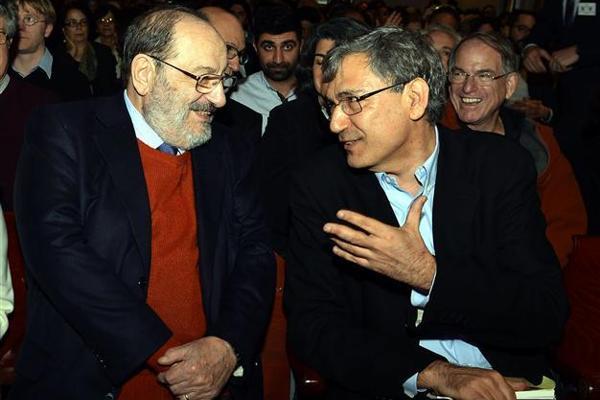Eco and Pamuk discuss being a novelist
ISTANBUL – Anatolia News Agency


Students queu tried to enter the saloon to attend the meeting. However, many had to stay outside and watched the panel from the screen. AA photo
Istanbul’s Boğaziçi University hosted Nobel laureate Orhan Pamuk and Italian novelist Umberto Eco at a seminar entitled “A Dialogue on Facts, Fiction, History,” on April 9.Both writers met with their fans and also held a discussion panel. The panel was moderated by Italian semiotics Professor Patrizia Violi.
Both authors explained to students how they became writers and joked about their personal fixations and obsessions. Pamuk explained that he wanted to be a novelist first of all to be alone. Eco, on the other hand, confessed that when he was young he gave up writing fiction, thinking that he wasn’t talented enough, until the day he submitted his thesis. “My supervisor told me that I had written my thesis as if it was a detective novel. He was wrong to think this was a mistake. All my life I have written essays posing as detective novels, until the day I decided to write a detective novel,” he said.
The meeting was held in the manner of a dialogue. Pamuk described how sometimes his friends told him he was being paranoid. “How can I not be a paranoid? Almost 35 years I have been a novelist and there is a paranoid part of being paranoid,” said Pamuk. Later on Pamuk turned to Eco and said, “You are a real master in this paranoid issue. I think you would explain it in the best way.”
Eco said: “I do not think that you have be paranoid in order to tell paranoid stories. My motto is: “Doctor, all the paranoids are following me.” That means I am surrounded by paranoids and I do not have be one.” The moderator Violi asked the authors why they chose to become writers.
Orhan Pamuk’s story
Pamuk said he wanted to become a painter between the ages of seven to 22. He also said that his family had generally studied engineering. Then he started studying architecture at Istanbul Technical University.
“However, later on, I decided that I wanted to live a lonely life. I never wanted a life in which I took orders from others or gave orders. I wanted to live the lonely life of a person who has a wide imagination.”
That’s how Pamuk realized that he could not be a painter. “Then I said to myself why can I not be a novelist?”
Noting that many people said, “I am a novelist because I have things to tell,” Pamuk said his situation was just the opposite. “To be honest, the things that I need to tell have come later on. I wanted to be a writer because I want a life of my own. I survived and succeeded and I am happy for that.”
Umberto Eco’s story
Eco, on the other hand, explained how he decided to be a novelist by saying: “Some people rob banks, some are pedophiles, some climb the Mont Blanc and I write novels. We cannot discuss the personal choices of people.”
Noting that he began “telling stories” from an early age, Eco said, however, “later on I saw that I do not have talent to write novels and gave up.”
When Eco was presenting his doctorate thesis, a professor in the jury has objected to the language he had used. “The professor said, ‘there are only results in the scientific research however you told these results like a detective novel.’”
“My professor was right but he was not right to say that the language in the thesis was a mistake or not right. I think all scientific researches should be written in detective novel language with mystery,” Eco said.
“That’s why I have written philosophy novels like a detective. At last I decided that I should write a detective novel,” Eco added.
Toward the end of the meeting, Pamuk said, “I am really happy to see Eco here. He is a great novelist. I am really grateful to be a part of such an event. I have learnt a lot from him.”
Pamuk thanked everyone and added that it had been a great discussion. Eco on the other hand responded with jokes. “In fact I cannot repeat his works because that would be plagiarism.”
Fans of the authors had tried to enter the hall to watch them, however it was very crowded and lots of students watched the authors from the screen that had been placed outside the hall.
The seminar was organized as part of Boğaziçi University’s celebrations of the 150th year of its establishment, in cooperation with the Italian Embassy and Italian Consulate, Italian Culture Center, Boğaziçi University and Şehir University.
